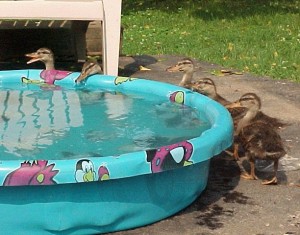Seven years ago, my husband and I raised five baby mallard ducks. It was an amazing experience and the kind of thing you never forget. Now, every spring the ducks come back to visit us, looking for corn and quacking in the front yard until we come out to feed them.
We became duck parents when my husband found their nest, abandoned under the living room window. Something had got into the nest – a possum, perhaps, or an inquisitive dog – and some of the eggs were destroyed.
So we got an incubator from a friend with a farm and he gave us a crash course in hatching baby ducks.
Five of the seven ducklings hatched. We were thrilled. But then we realized… where the heck do we put them? With plenty of flat, grassy yard but no fence, and with both of us away at work during the day, the garage became the ducklings’ new home.
We banished our vehicles from the garage to the driveway for the duration of the spring and summer, and installed a fan to keep the ducks comfortable during the day. Next, we bought a plastic kiddie pool and filled it with water. Every day, we let the ducks outside to roam in the grass overlooking the river, herding them away if they wandered too close to the road, then plopped them in the pool to have their daily swim.
And they loved it.
Of course, the garage floor had to be hosed down every evening to wash away the duck poop. And boy, does duck poop smell. Just imagine the smell of ammonia, times ten. And leaving for work every morning was difficult, because I wanted to stay and hang out with the ducks, and they wanted me to stay, too.
I became attached to the youngest duck. She limped, and wasn’t as big as her brothers and sisters. We took her to a vet, who advised us the best thing to do was to put her down.
Needless to say, we didn’t listen to his advice.
Instead, we fed the ducks a diet of fortified Maypo along with their duck pellets. And funnily enough, the littlest duck began to improve. Her limp became less pronounced and her quacks became the loudest. We dubbed her “Bigmouth.”
One by one, at the end of the summer, the ducks flew away, until Bigmouth was the only one left. She seemed reluctant to leave. Yet she looked across at the river with longing, and I knew she was missing her brothers and sisters.
Finally, the time came for her to go. It was late afternoon and I sat alone in a lawn chair in the driveway. She waddled up to me, quacking earnestly.
“It’s okay,” I told her softly, even as my throat tightened a little. “I know it’s time for you to go.”
She stood in the driveway, torn between her desire to stay and her innate need to go. She looked at me one last time, gave a loud goodbye “quack,” and flew up and away, off to find her brothers and sisters on the river.
Okay, I admit it. I cried a little.
I knew she had to go; I knew she longed to be on the river. And she belonged with her brother and sister ducks, paddling in the water, flying joyously together overhead, wheeling and quacking and being… a duck. It was only natural, after all.
But I still hated to see her go.
Yet each spring, one of us will hear her distinctive, big-mouthed quack echoing across the river, and we smile…
…because it means our Bigmouth has survived another winter, another hunting season, and lives to quack again.
Follow me on Bookbub!